不定代词用法归纳
关于不定代词的用法
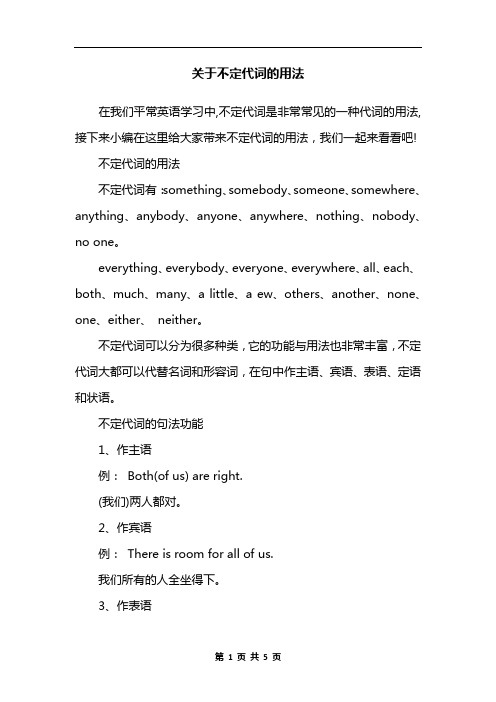
关于不定代词的用法在我们平常英语学习中,不定代词是非常常见的一种代词的用法,接下来小编在这里给大家带来不定代词的用法,我们一起来看看吧!不定代词的用法不定代词有:something、somebody、someone、somewhere、anything、anybody、anyone、anywhere、nothing、nobody、no one。
everything、everybody、everyone、everywhere、all、each、both、much、many、a little、a ew、others、another、none、one、either、neither。
不定代词可以分为很多种类,它的功能与用法也非常丰富,不定代词大都可以代替名词和形容词,在句中作主语、宾语、表语、定语和状语。
不定代词的句法功能1、作主语例:Both(of us) are right.(我们)两人都对。
2、作宾语例:There is room for all of us.我们所有的人全坐得下。
3、作表语例:Thats nothing.没什么。
4、作定语例:You may take either road.两条路你走哪条都行。
向左转|向右转扩展资料1、除every 和no外,不定代词既可用作名词,也可用作形容词。
every和no在句中只能作定语.例如:I have no idea about it.我没有任何主意。
2、all指三者以上,是都的意思。
all的单复数由它所修饰或指代的名词的单复数决定。
例如:All goes well.一切进展得很好。
all 通常不与可数名词单数连用,如:不说all the book,而说the whole book.但all可与表时间的可数名词单数连用,如all day,all night,all the year;但习惯上不说all hour,all century.all还可以与一些特殊的单数名词连用,如all China,all the city,all my life,all the way.3、both都,指两者。
不定代词用法总结

不定代词用法总结-标准化文件发布号:(9556-EUATWK-MWUB-WUNN-INNUL-DDQTY-KII不定代词用法总结1) some, any, no的用法a. some和any通常用于表示不定数或不定量,修饰复数可数名词或不可数名词。
some表示“几个;一些;部分”,多用于肯定句;而any表示“一些;什么;任何;”,对用于否定句或疑问句中。
如:* He asked me some questions. (他问了我几个问题。
) * Some of the bread has been eaten. (面包已吃了一些。
) * Are there any stamps in this post office(这个邮局里有邮票吗?)* I didn’t have any cigarettes, so I went out to buy some. (我没有香烟了,所以出去买了一些。
)b. 刚才我们说some一般用于肯定句而any一般用于否定句和疑问句。
但有时也有例外。
这要根据句子意思来看。
* I could not answer some of his questions. (我不能回答他的某些问题。
)(some用在否定句中表示“一些;部分”。
如果说成:I could not answer any of his questions.意思就变了,它表示“我不能回答他的任何问题。
”)* Will you get me some apples on your way back (你回来的路上能给我带一些苹果吗?)(some用在疑问句中大多表示“请求” 或“建议”)* Let me know if you hear any news. (如果你有任何消息请告诉我。
) (any用在条件从句中表示“任何”)* “What would you like to drink”“Any will do.” (“你想喝什么?”“哪种都行。
不定代词的用法
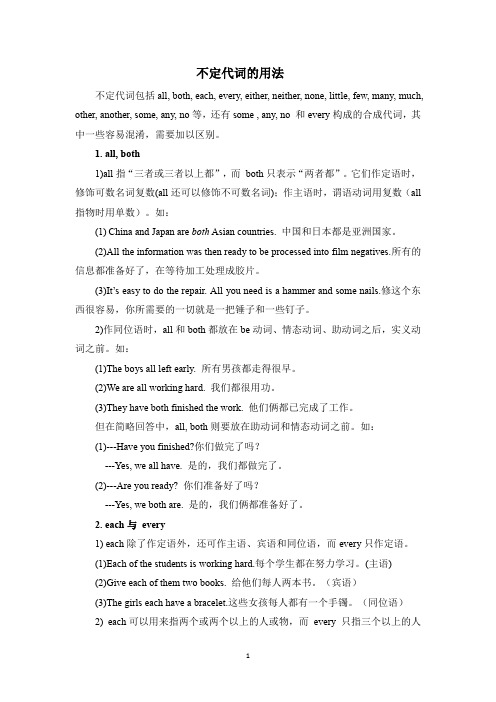
不定代词的用法不定代词包括all, both, each, every, either, neither, none, little, few, many, much, other, another, some, any, no等,还有some , any, no 和every构成的合成代词,其中一些容易混淆,需要加以区别。
1. all, both1)all指“三者或三者以上都”,而both只表示“两者都”。
它们作定语时,修饰可数名词复数(all还可以修饰不可数名词);作主语时,谓语动词用复数(all 指物时用单数)。
如:(1)China and Japan are both Asian countries. 中国和日本都是亚洲国家。
(2)All the information was then ready to be processed into film negatives.所有的信息都准备好了,在等待加工处理成胶片。
(3)It’s easy to do the repair. All you need is a hammer and some nails.修这个东西很容易,你所需要的一切就是一把锤子和一些钉子。
2)作同位语时,all和both都放在be动词、情态动词、助动词之后,实义动词之前。
如:(1)The boys all left early. 所有男孩都走得很早。
(2)We are all working hard. 我们都很用功。
(3)They have both finished the work. 他们俩都已完成了工作。
但在简略回答中,all, both则要放在助动词和情态动词之前。
如:(1)---Have you finished?你们做完了吗?---Yes, we all have. 是的,我们都做完了。
(2)---Are you ready? 你们准备好了吗?---Yes, we both are. 是的,我们俩都准备好了。
不定代词的用法归纳
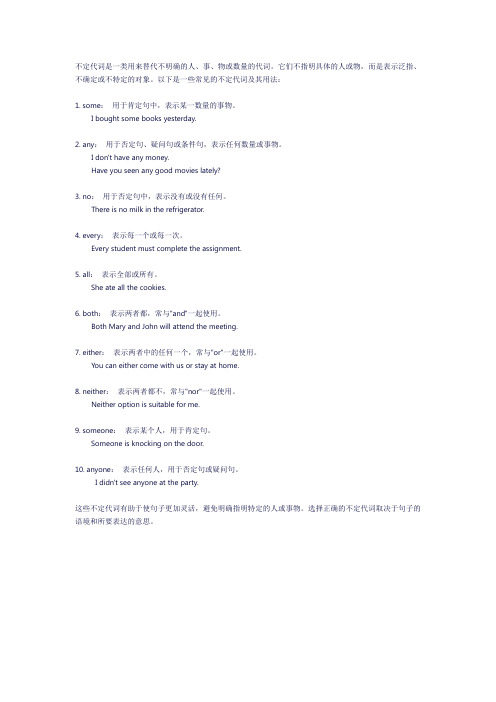
不定代词是一类用来替代不明确的人、事、物或数量的代词。
它们不指明具体的人或物,而是表示泛指、不确定或不特定的对象。
以下是一些常见的不定代词及其用法:1. some:用于肯定句中,表示某一数量的事物。
I bought some books yesterday.2. any:用于否定句、疑问句或条件句,表示任何数量或事物。
I don't have any money.Have you seen any good movies lately?3. no:用于否定句中,表示没有或没有任何。
There is no milk in the refrigerator.4. every:表示每一个或每一次。
Every student must complete the assignment.5. all:表示全部或所有。
She ate all the cookies.6. both:表示两者都,常与"and"一起使用。
Both Mary and John will attend the meeting.7. either:表示两者中的任何一个,常与"or"一起使用。
You can either come with us or stay at home.8. neither:表示两者都不,常与"nor"一起使用。
Neither option is suitable for me.9. someone:表示某个人,用于肯定句。
Someone is knocking on the door.10. anyone:表示任何人,用于否定句或疑问句。
I didn't see anyone at the party.这些不定代词有助于使句子更加灵活,避免明确指明特定的人或事物。
选择正确的不定代词取决于句子的语境和所要表达的意思。
(完整版)不定代词用法归纳
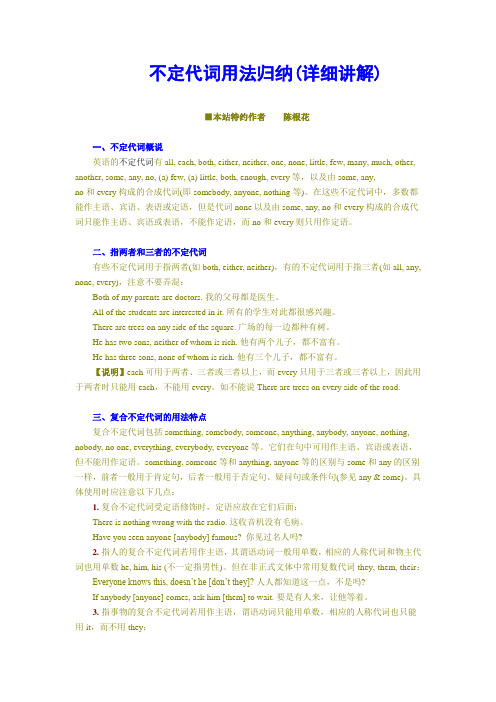
不定代词用法归纳(详细讲解)■本站特约作者陈根花一、不定代词概说英语的不定代词有 all, each, both, either, neither, one, none, little, few, many, much, other, another, some, any, no, (a) few, (a) little, both, enough, every 等,以及由 some, any,no 和 every 构成的合成代词(即somebody, anyone, nothing 等)。
在这些不定代词中,多数都能作主语、宾语、表语或定语,但是代词 none 以及由 some, any, no 和 every 构成的合成代词只能作主语、宾语或表语,不能作定语,而 no 和 every 则只用作定语。
二、指两者和三者的不定代词有些不定代词用于指两者(如both, either, neither),有的不定代词用于指三者(如all, any, none, every),注意不要弄混:Both of my parents are doctors. 我的父母都是医生。
All of the students are interested in it. 所有的学生对此都很感兴趣。
There are trees on any side of the square. 广场的每一边都种有树。
He has two sons, neither of whom is rich. 他有两个儿子,都不富有。
He has three sons, none of whom is rich. 他有三个儿子,都不富有。
【说明】each 可用于两者、三者或三者以上,而 every 只用于三者或三者以上,因此用于两者时只能用 each,不能用 every。
如不能说 There are trees on every side of the road.三、复合不定代词的用法特点复合不定代词包括 something, somebody, someone, anything, anybody, anyone, nothing, nobody, no one, everything, everybody, everyone 等。
不定代词用法总结

不定代词用法总结不定代词是在句子中代替特定人或物的词语,它们的使用能够让句子更加简洁明了。
下面是对不定代词的用法做一个总结。
1. 一般不定代词一般不定代词包括"something"、"anything"、"nothing"、"everything"等,它们用来代替不具体指向的事物。
例如:- I have something to tell you.- Is there anything I can do for you?- Don't worry, it's nothing serious.- She knows everything about that topic.2. 不定代词"some"和"any""some"和"any"可以用作不定代词,也可以用作不定代词,具体使用要根据句子的语境来确定。
当"some"用作不定代词时,表示肯定或推测的意思。
例如:- There are some books on the table.- Can I have some water, please?当"any"用作不定代词时,表示否定或疑问的意思。
- I don't have any money with me.- Do you have any ideas for the project?3. 不定代词"somebody"、"anybody"、"nobody"和"everybody"这些不定代词用来代替人。
它们的使用方式类似于前面提到的一般不定代词。
例如:- Somebody is waiting for you outside.- Nobody knows the answer.- Can anybody help me with this problem?- Everybody enjoyed the party.4. 不定代词"each"和"every""each"和"every"用来代替三者或多者中的每一个。
不定代词用法总结
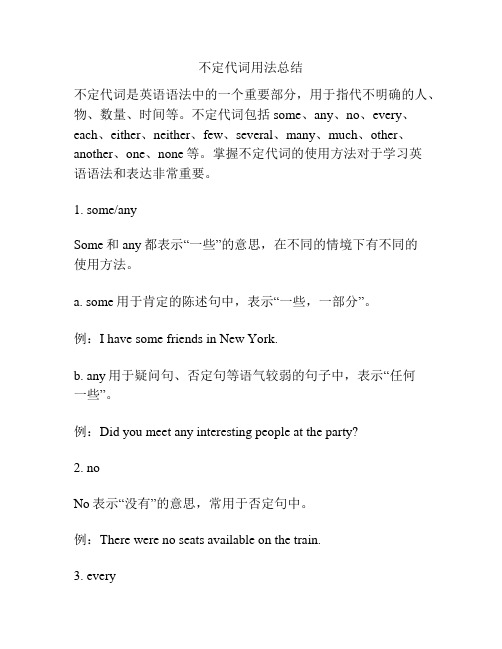
不定代词用法总结不定代词是英语语法中的一个重要部分,用于指代不明确的人、物、数量、时间等。
不定代词包括some、any、no、every、each、either、neither、few、several、many、much、other、another、one、none等。
掌握不定代词的使用方法对于学习英语语法和表达非常重要。
1. some/anySome和any都表示“一些”的意思,在不同的情境下有不同的使用方法。
a. some用于肯定的陈述句中,表示“一些,一部分”。
例:I have some friends in New York.b. any用于疑问句、否定句等语气较弱的句子中,表示“任何一些”。
例:Did you meet any interesting people at the party?2. noNo表示“没有”的意思,常用于否定句中。
例:There were no seats available on the train.3. everyEvery表示“每一个”的意思。
例:Every student is required to attend the meeting.4. eachEach表示“每一个”,用于强调个体。
例:Each student is responsible for his or her own progress.5. either/neitherEither表示“两者中的任何一个”,neither表示“两者都不”。
例:You can choose either the blue or the red dress.例:Neither of us likes to cook.6. few/several/many/much这些代词都用于表示数量或程度。
a. few表示“很少,几乎没有”。
例:There were few people in the park on such a hot day.b. several表示“几个,若干”。
不定代词的用法归纳
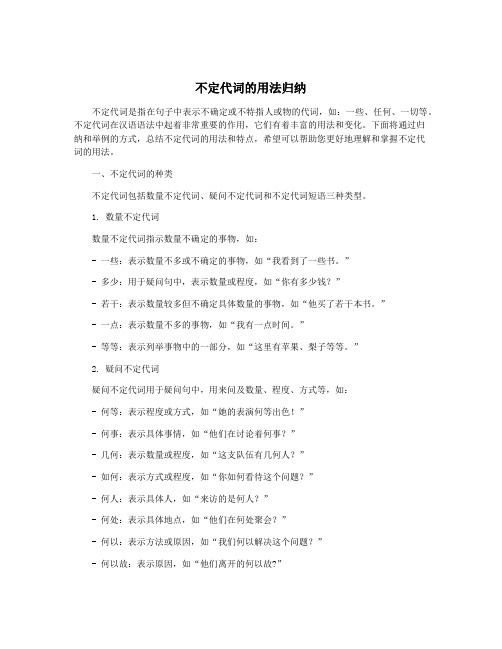
不定代词的用法归纳不定代词是指在句子中表示不确定或不特指人或物的代词,如:一些、任何、一切等。
不定代词在汉语语法中起着非常重要的作用,它们有着丰富的用法和变化。
下面将通过归纳和举例的方式,总结不定代词的用法和特点,希望可以帮助您更好地理解和掌握不定代词的用法。
一、不定代词的种类不定代词包括数量不定代词、疑问不定代词和不定代词短语三种类型。
1. 数量不定代词数量不定代词指示数量不确定的事物,如:- 一些:表示数量不多或不确定的事物,如“我看到了一些书。
”- 多少:用于疑问句中,表示数量或程度,如“你有多少钱?”- 若干:表示数量较多但不确定具体数量的事物,如“他买了若干本书。
”- 一点:表示数量不多的事物,如“我有一点时间。
”- 等等:表示列举事物中的一部分,如“这里有苹果、梨子等等。
”2. 疑问不定代词疑问不定代词用于疑问句中,用来问及数量、程度、方式等,如:- 何等:表示程度或方式,如“她的表演何等出色!”- 何事:表示具体事情,如“他们在讨论着何事?”- 几何:表示数量或程度,如“这支队伍有几何人?”- 如何:表示方式或程度,如“你如何看待这个问题?”- 何人:表示具体人,如“来访的是何人?”- 何处:表示具体地点,如“他们在何处聚会?”- 何以:表示方法或原因,如“我们何以解决这个问题?”- 何以故:表示原因,如“他们离开的何以故?”3. 不定代词短语不定代词短语是由一个或多个词组成的不定代词,如:- 有的(少数):表示有一部分事物,如“有的学生不喜欢数学。
”- 无论(不分别):表示两者都一样,如“无论贫富,人生都应该平等。
” - 也许(或许):表示可能性,如“也许他今天会来。
”- 可能(或许):表示可能性,如“他可能迟到了。
”- 不论(无论):表示两者都一样,如“不论去哪里,我都会支持你。
”二、不定代词的用法1. 作主语不定代词可以作为句子的主语来表示不定的人或物,如:- 任何人都可以报名参加。
不定代词用法
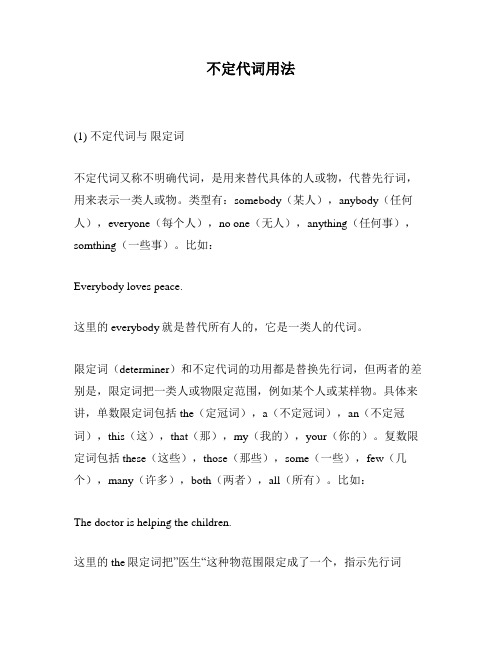
不定代词用法(1) 不定代词与限定词不定代词又称不明确代词,是用来替代具体的人或物,代替先行词,用来表示一类人或物。
类型有:somebody(某人),anybody(任何人),everyone(每个人),no one(无人),anything(任何事),somthing(一些事)。
比如:Everybody loves peace.这里的everybody就是替代所有人的,它是一类人的代词。
限定词(determiner)和不定代词的功用都是替换先行词,但两者的差别是,限定词把一类人或物限定范围,例如某个人或某样物。
具体来讲,单数限定词包括 the(定冠词),a(不定冠词),an(不定冠词),this(这),that(那),my(我的),your(你的)。
复数限定词包括these(这些),those(那些),some(一些),few(几个),many(许多),both(两者),all(所有)。
比如:The doctor is helping the children.这里的the限定词把”医生“这种物范围限定成了一个,指示先行词doctor指代的是一位具体的人,而不是一类人,一类物。
(2) 不定代词与名词不定代词常常紧跟名词一起构成短语,表示一类或多类先行词。
有时不定代词替代先行词中的名词,有时又用作补充,在名词和形容词之间,用来确定这个名词指代什么。
比如:Give me something to read.这句话的something就是一类人或物的不定代词,来补充表示具体的读物,而不是吃物或看物。
(3) 不定代词与名词性短语不定代词与名词性短语在句子中也有不同的用法,例如:He has something to say.这里的something就是一类人或物的不定代词,来补充表示”要说的“,而不是具体的内容。
(4) 不定代词与不定式不定代词也可以和不定式一起构成短语,表示一类或多类的动作,主要有something to do,something to think,something to say等,比如:He has something to do.这里的something就是一类人或物的不定代词,来补充表示”要做的“,而不是具体的事情。
不定代词用法归纳

不定代词用法归纳一、不定代词概说英语的不定代词有 all, each, both, either, neither, one, none, little, few, many, much,other, another, some, any, no, (a) few, (a) little, both, enough, every 等,以及由 some, a ny, no 和 every 构成的合成代词(即 somebody, anyone, nothing 等)。
在这些不定代词中,多数都能作主语、宾语、表语或定语,但是代词 none 以及由 some, any, no 和 every 构成的合成代词只能作主语、宾语或表语,不能作定语,而 no 和 every 则只用作定语。
二、指两者和三者的不定代词有些不定代词用于指两者(如 both, either, neither),有的不定代词用于指三者 (如 all, an y, none, every) ,注意不要弄混:Both of my parents are doctors. 我的父母都是医生。
All of the students are interested in it. 所有的学生对此都很感兴趣。
There are trees on any side of the square. 广场的每一边都种有树。
He has two sons, neither of whom is rich. 他有两个儿子,都不富有。
He has three sons, none of whom is rich. 他有三个儿子,都不富有。
【说明】each 可用于两者、三者或三者以上,而 every 只用于三者或三者以上,因此用于两者时只能用 each,不能用 every 。
如不能说 There are trees on every side of the ro ad.三、复合不定代词的用法特点复合不定代词包括 something, somebody, someone, anything, anybody, anyone, nothin g, nobody, no one, everything, everybody, everyone 等。
完整版)不定代词用法总结
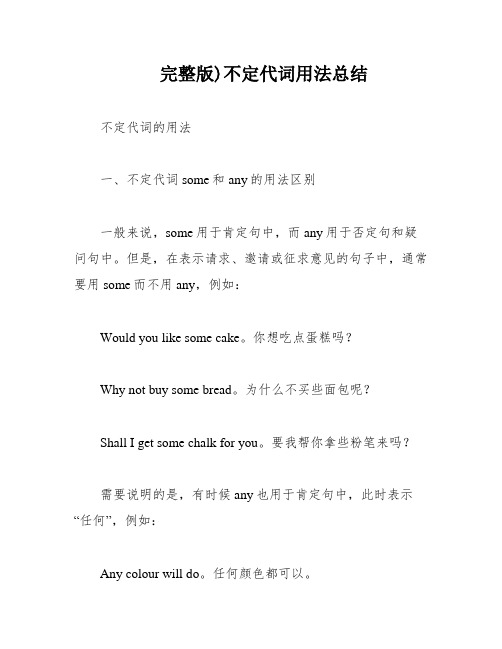
完整版)不定代词用法总结不定代词的用法一、不定代词some和any的用法区别一般来说,some用于肯定句中,而any用于否定句和疑问句中。
但是,在表示请求、邀请或征求意见的句子中,通常要用some而不用any,例如:Would you like some cake。
你想吃点蛋糕吗?Why not buy some bread。
为什么不买些面包呢?Shall I get some chalk for you。
要我帮你拿些粉笔来吗?需要说明的是,有时候any也用于肯定句中,此时表示“任何”,例如:Any colour will do。
任何颜色都可以。
Come any day you like。
你随便哪天来都可以。
二、不定代词many和much的用法以及区别不定代词many和much都表示“许多”,但many修饰或代替可数名词(复数),与few(少数)相对;而much用来修饰或代替不可数名词(单数),与little(少量)相对。
在口语中,两者主要用于非肯定句中,例如:Did you see many people there。
你在那儿看见许多人了吗?We don’t have much time。
我们没有许多时间。
XXX work has been done。
许多工作都已经做了。
You’ve given me too much。
你给我太多了。
Take as many (much) as you want。
你要多少拿多少。
I asked her a great many ns。
我问了她许多问题。
另外需要注意的是,too much可以作副词或代词,也可以用作形容词修饰不可数名词,例如:Is watching TV too much good or bad for your health。
看电视太多对你的健康有益还是有害?You’ve given me too much。
你给我的太多了。
We’ve had too much rain lately。
不定代词的用法

不定代词的用法1. some,any(1) some多用于肯定句,修饰复数可数名词和不可数名词,作“一些”解。
它还可修饰单数可数名词,作“某一”解。
如:H-5 avian influenza first broke out in some Asian countries.H-5型禽流感首先在亚洲爆发。
Some people are early risers. 有些人起得很早。
(2) any通常用于否定句、疑问句或条件句,修饰单数或复数可数名词以及不可数名词。
If there are any new magazines in the library, take some for me.图书馆如果来了新杂志,替我借几本。
Are there any stamps in the drawer? 抽屉里有邮票吗?Is there any money with you? 你身上带钱了吗?(3) any还可以用于肯定句,作“任何的”解。
You can come here any time. 你什么时候来都行。
You can get it at any shop. 你可以在任何一家商店买到它。
2. either,both,all(1) either表示“两者中的任何一个”。
Either of the brothers is selfish. 两兄弟都非常自私。
Either will do. 两个都行。
(2) both“两个都”,修饰可数名词,统指两者。
Tom and Jack both made some progress. 汤姆和杰克两个都有所进步。
Both of them should make concessions. 他们双方都应做出让步。
(3) all“全部,所有的”,修饰可数名词和不可数名词,指两个以上的人或物。
All the students contributed to the fund.所有的学生都为基金会捐了款。
不定代词的用法总结
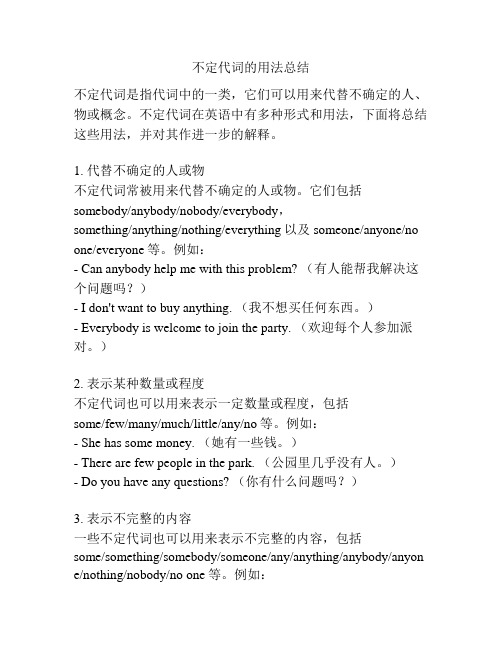
不定代词的用法总结不定代词是指代词中的一类,它们可以用来代替不确定的人、物或概念。
不定代词在英语中有多种形式和用法,下面将总结这些用法,并对其作进一步的解释。
1. 代替不确定的人或物不定代词常被用来代替不确定的人或物。
它们包括somebody/anybody/nobody/everybody,something/anything/nothing/everything以及someone/anyone/no one/everyone等。
例如:- Can anybody help me with this problem? (有人能帮我解决这个问题吗?)- I don't want to buy anything. (我不想买任何东西。
)- Everybody is welcome to join the party. (欢迎每个人参加派对。
)2. 表示某种数量或程度不定代词也可以用来表示一定数量或程度,包括some/few/many/much/little/any/no等。
例如:- She has some money. (她有一些钱。
)- There are few people in the park. (公园里几乎没有人。
)- Do you have any questions? (你有什么问题吗?)3. 表示不完整的内容一些不定代词也可以用来表示不完整的内容,包括some/something/somebody/someone/any/anything/anybody/anyon e/nothing/nobody/no one等。
例如:- I have something to tell you. (我有件事要告诉你。
)- Is there anyone who can help me? (有人可以帮帮我吗?)- She knows nothing about it. (她对此一无所知。
代词:不定代词用法归纳

代词:不定代词用法归纳不定代词是指用来代替特定人或事物的词语,它们的使用能够使语言更加简洁明了。
下面是一些常见的不定代词及其用法归纳:1.人称不定代词___:指某个人,表示不确定的人,相当于“某人”。
___:指某个人,表示不确定的人,相当于“某人”。
___:指某个人,表示不确定的人,相当于“某人”。
___:指某个人,表示不确定的人,相当于“某人”。
___:指某个人,表示不确定的人,相当于“某人”。
___:指某个人,表示不确定的人,相当于“某人”。
___:指某个人,表示不确定的人,相当于“某人”。
___:指某个人,表示不确定的人,相当于“某人”。
___:指某个人,表示不确定的人,相当于“某人”。
anyone / anybody:任何人,表示不限制特定的人,常用于疑问句、否定句和条件句中。
anyone / anybody:任何人,表示不限制特定的人,常用于疑问句、否定句和条件句中。
anyone / anybody:任何人,表示不限制特定的人,常用于疑问句、否定句和条件句中。
anyone / anybody:任何人,表示不限制特定的人,常用于疑问句、否定句和条件句中。
anyone / anybody:任何人,表示不限制特定的人,常用于疑问句、否定句和条件句中。
anyone / anybody:任何人,表示不限制特定的人,常用于疑问句、否定句和条件句中。
anyone / anybody:任何人,表示不限制特定的人,常用于疑问句、否定句和条件句中。
anyone / anybody:任何人,表示不限制特定的人,常用于疑问句、否定句和条件句中。
anyone / anybody:任何人,表示不限制特定的人,常用于疑问句、否定句和条件句中。
___:每个人,表示所有的人,常用于肯定句中。
___:每个人,表示所有的人,常用于肯定句中。
___:每个人,表示所有的人,常用于肯定句中。
___:每个人,表示所有的人,常用于肯定句中。
不定代词用法总结
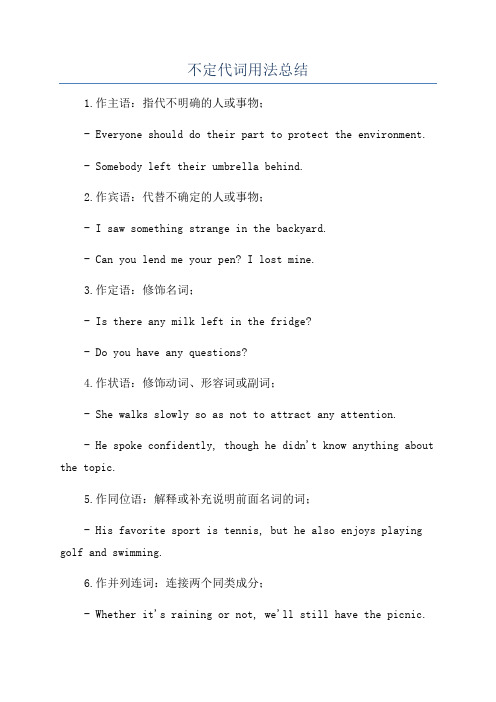
不定代词用法总结1.作主语:指代不明确的人或事物;- Everyone should do their part to protect the environment.- Somebody left their umbrella behind.2.作宾语:代替不确定的人或事物;- I saw something strange in the backyard.- Can you lend me your pen? I lost mine.3.作定语:修饰名词;- Is there any milk left in the fridge?- Do you have any questions?4.作状语:修饰动词、形容词或副词;- She walks slowly so as not to attract any attention.- He spoke confidently, though he didn't know anything about the topic.5.作同位语:解释或补充说明前面名词的词;- His favorite sport is tennis, but he also enjoys playing golf and swimming.6.作并列连词:连接两个同类成分;- Whether it's raining or not, we'll still have the picnic.7.作插入语:用于句子中,表示强调、感叹或补充说明;- Honestly, I don't know what to do in this situation.- Wow, that's incredible!总之,不定代词用于代表不明确的人或事物,作为主语、宾语、定语等部分。
同时,不定代词也可以用作并列连词、插入语等。
初中英语8个不定代词

初中英语8个不定代词
不定代词通常指的是一类用于替代不确定或泛指人或事物的词汇。
1 Somebody / Someone:
用法:指代不特定的人。
例句:Somebody is waiting for you at the door.
2 Something:
用法:指代不特定的事物。
例句:I heard something strange in the backyard.
3 Anybody / Anyone:
用法:用于疑问句或否定句,指代任何一个人。
例句:Has anyone seen my keys?
4 Anything:
用法:指代任何事物。
例句:You can ask me anything you want.
5 Everybody / Everyone:
用法:指代所有人,强调每个人。
例句:Everyone is invited to the party.
6 Everything:
用法:指代所有事物,强调每件事物。
例句:She has to finish everything before leaving.
7 Nobody / No one:
用法:指代没有任何人。
例句:Nobody knows the answer to that question.
8 Nothing:
用法:指代没有任何事物。
例句:There is nothing in the fridge.。
不定代词用法

e.g: 1)He looked for his pen everywhere . 2) This summer he stayed at home or go nowhere .
训练场
1、She looked inside the box, but she saw__D___ in it .
e.g : 1) Someone is knocking at the door, isn’t he / aren’t
they ?
2) There, everything goes well , doesn’t it ?
6、复合不定代词作主语时,谓语动词必须用单数形 式。
e.g : 1) Everything begins to grow in spring. 2) There is something new in today’s newspaper .
Your penfriend,
Sun Xiaoli
A. Can it B. can’t it C. can they D. can’t they
4、We must find_A_____ to do the work .
A. Somebody careful B. careful nobody
C. Nobody careful
D. careful somebody
No . The table hasn’t been set yet .
A. Anything B. everything C.nothing D. something
作 文 点 评(范文)
Dear Emily, I'm sorry to hear that you are ill again. My mom often tells something about how to stay healthy. I will tell you what she tells me. She often says, “Drink more milk and water.”She asks me to eat more fruit and vegetables. She says that I should eat vegetables at least three times a day . She also encourages me to go outside and play . I like to play basketball with my friends. Maybe you could do the same. I think my mom's advice is good . Maybe you can try the same and see if it helps. I hope you get well soon .
不定代词的用法归纳
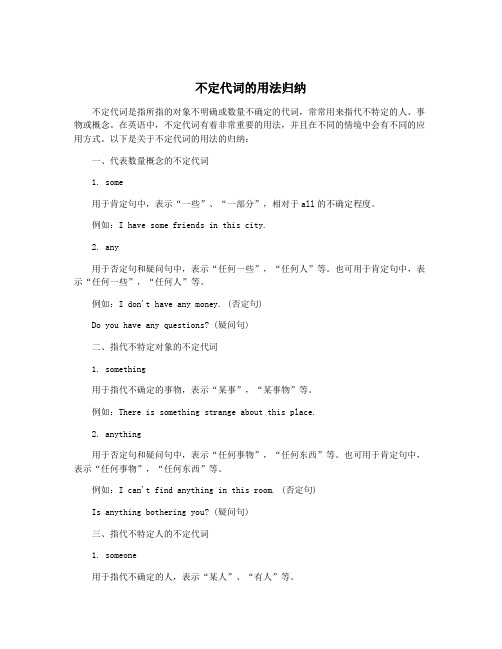
不定代词的用法归纳不定代词是指所指的对象不明确或数量不确定的代词,常常用来指代不特定的人、事物或概念。
在英语中,不定代词有着非常重要的用法,并且在不同的情境中会有不同的应用方式。
以下是关于不定代词的用法的归纳:一、代表数量概念的不定代词1. some用于肯定句中,表示“一些”、“一部分”,相对于all的不确定程度。
例如:I have some friends in this city.2. any用于否定句和疑问句中,表示“任何一些”,“任何人”等。
也可用于肯定句中,表示“任何一些”,“任何人”等。
例如:I don't have any money. (否定句)Do you have any questions? (疑问句)二、指代不特定对象的不定代词1. something用于指代不确定的事物,表示“某事”,“某事物”等。
例如:There is something strange about this place.2. anything用于否定句和疑问句中,表示“任何事物”,“任何东西”等。
也可用于肯定句中,表示“任何事物”,“任何东西”等。
例如:I can't find anything in this room. (否定句)Is anything bothering you? (疑问句)三、指代不特定人的不定代词1. someone用于指代不确定的人,表示“某人”、“有人”等。
例如:I saw someone waiting for you outside.2. anyone用于否定句和疑问句中,表示“任何人”,“任何人物”等。
也可用于肯定句中,表示“任何人”,“任何人物”等。
例如:I don't want to talk to anyone right now. (否定句)Has anyone called for me? (疑问句)四、表示不定数量或程度的不定代词1. much用于肯定句和否定句中,表示“很多”,“大量”等。
不定代词用法总结

不定代词用法总结1)some,any,no的用法a。
some和any通常用于表示不定数或不定量,修饰复数可数名词或不可数名词。
some表示“几个;一些;部分”,多用于肯定句;而any表示“一些;什么;任何;”,对用于否定句或疑问句中.如:*He asked me some questions。
(他问了我几个问题。
)*Some of the bread has been eaten。
(面包已吃了一些。
)*Are there any stamps in this post office? (这个邮局里有邮票吗?)*I didn’t have any cigarettes, so I went out to buy some。
(我没有香烟了,所以出去买了一些。
)b. 刚才我们说some一般用于肯定句而any一般用于否定句和疑问句。
但有时也有例外。
这要根据句子意思来看。
* I could not answer some of his questions. (我不能回答他的某些问题.)(some用在否定句中表示“一些;部分”.如果说成:I could not answer any of his questions.意思就变了,它表示“我不能回答他的任何问题。
”)*Will you get me some apples on your way back?(你回来的路上能给我带一些苹果吗?)(some用在疑问句中大多表示“请求” 或“建议")*Let me know if you hear any news. (如果你有任何消息请告诉我。
) (any用在条件从句中表示“任何")* “What would you like t o drink?” “Any will do.” (“你想喝什么?”“哪种都行。
”) (any在这里表示“任何”)c. no在句子中作定语,表示否定,意思是“没有;不是”,它可以修饰可数名词的单数和复数形式或不可数名词.* There are no letters for you today. (今天没有你的信。
- 1、下载文档前请自行甄别文档内容的完整性,平台不提供额外的编辑、内容补充、找答案等附加服务。
- 2、"仅部分预览"的文档,不可在线预览部分如存在完整性等问题,可反馈申请退款(可完整预览的文档不适用该条件!)。
- 3、如文档侵犯您的权益,请联系客服反馈,我们会尽快为您处理(人工客服工作时间:9:00-18:30)。
不定代词用法归纳(详细讲解)■本站特约作者陈根花一、不定代词概说英语的不定代词有 all, each, both, either, neither, one, none, little, few, many, much, other, another, some, any, no, (a) few, (a) little, both, enough, every 等,以及由 some, any,no 和 every 构成的合成代词(即somebody, anyone, nothing 等)。
在这些不定代词中,多数都能作主语、宾语、表语或定语,但是代词 none 以及由 some, any, no 和 every 构成的合成代词只能作主语、宾语或表语,不能作定语,而 no 和 every 则只用作定语。
二、指两者和三者的不定代词有些不定代词用于指两者(如both, either, neither),有的不定代词用于指三者(如all, any, none, every),注意不要弄混:Both of my parents are doctors. 我的父母都是医生。
All of the students are interested in it. 所有的学生对此都很感兴趣。
There are trees on any side of the square. 广场的每一边都种有树。
He has two sons, neither of whom is rich. 他有两个儿子,都不富有。
He has three sons, none of whom is rich. 他有三个儿子,都不富有。
【说明】each 可用于两者、三者或三者以上,而 every 只用于三者或三者以上,因此用于两者时只能用 each,不能用 every。
如不能说 There are trees on every side of the road.三、复合不定代词的用法特点复合不定代词包括 something, somebody, someone, anything, anybody, anyone, nothing, nobody, no one, everything, everybody, everyone 等。
它们在句中可用作主语、宾语或表语,但不能用作定语。
something, someone 等和 anything, anyone等的区别与 some 和 any 的区别一样,前者一般用于肯定句,后者一般用于否定句、疑问句或条件句(参见 any & some)。
具体使用时应注意以下几点:1.复合不定代词受定语修饰时,定语应放在它们后面:There is nothing wrong with the radio. 这收音机没有毛病。
Have you seen anyone [anybody] famous? 你见过名人吗?2.指人的复合不定代词若用作主语,其谓语动词一般用单数,相应的人称代词和物主代词也用单数 he, him, his (不一定指男性)。
但在非正式文体中常用复数代词 they, them, their:Everyone knows this, doesn’t he [don’t they]?人人都知道这一点,不是吗?If anybody [anyone] comes, ask him [them] to wait. 要是有人来,让他等着。
3.指事物的复合不定代词若用作主语,谓语动词只能用单数,相应的人称代词也只能用 it,而不用 they:Everything is ready, isn’t it?一切都准备好了,是吗?4.不定代词 anyone, everyone 等只能指人,不能指物,且其后一般不接of 短语。
若是指物或后接 of 短语,可用 any one, every one (分开写):any one of the boys (books) 孩子们(书)当中的任何一个(本)every one of the students (schools) 每一个学生(一所学校)四、不定代词any与not连用——是any not 还是 not any按英语习惯,any 以及含有any的复合不定代词用于否定句时,它只能出现在否定词之后,而不能在否定词之前:误:Any one doesn’t know how to do it.正:No one knows how to do it. 任何人都不知道如何做它。
误:Anybody [Anyone] cannot do it.正:Nobody [No one] can do it. 这事谁也干不了。
误:Anything cannot prevent me from going.正:Nothing can prevent me from going. 什么也不能阻挡我去。
五、不定代词与部分否定不定代词all, both, every 等与 not 连用时构成部分否定;若要表示完全否定,则需换用 none, neither, no one等。
比较:All of the students like the novel. 所有这些学生都喜欢这本小说。
Not all of the students like the novel. 并不是所有这些学生都喜欢这本小说。
All of the students don’t like the novel.并不是所有这些学生都喜欢这本小说。
None of the students like the novel. 这些学生当中没有一个喜欢这本小说。
六、不定代词all, both, each 等用作同位语不定代词all, both, each 等若用作主语同位语,主语可以是名词或代词;若用作宾语等其他成分的同位语,则宾语等成分必须是人称代词,而不能是名词:We have all read it. 我们都读过他。
(all 修饰的主语是代词)The villages have all been destroyed. 村庄都被毁了。
(all 修饰的主语是名词)They told us all to wait there. 他叫我们都在那儿等。
(all 修饰的宾语是代词)但不能说:They told the men all to wait there. (all 修饰的宾语是名词不是代词)七、不定代词so little 与 such little的区别用so little 还是such little 取决于不定代词little 的意思:若表示数量方面的“少”,则用so little;若表示形状体积的“小”,则用such little:He has so little time for reading. 他读书的时间少得可怜。
I’ve never seen such little boxes.我从未见过那样小的盒子。
八、不定代词some 与 any 的用法区别一般说来,不定代词 some 用于肯定句中,any 用于否定句和疑问句中。
但是,在表示请求、邀请或征求意见的句子中,通常要用 some 而不用any:Would you like some cake? 吃点蛋糕吗?Why not buy some bread? 为什么不买些面包呢?Shall I get some chalk for you? 要我帮你拿些粉笔来吗?【说明】不定代词any 有时也用于肯定句中,此时表示“任何”:Any colour will do. 任何颜色都行。
Come any day you like. 随便哪天来都可以。
九、不定代词many 与 much 的用法区别不定代词 many 和much 都表示“许多”,但 many 修饰或代替可数名词(复数),与 few(少数)相对;而 much 用来修饰或代替不可数名词(单数),与little(少量)相对。
在口语中两者主要用于非肯定句中:Did you see many people there? 你在那儿看见许多人了吗?We don’t have much time.我们没有许多时间。
在肯定句中,一般用 a lot of, lots of, plenty of 等代之。
但在正式文体中有时也用于肯定句中;另外,若用作主语或主语的定语,或其前有 how, too, as, so, a good, a great 等修饰,也可用于肯定句中:Many of us left early. 我们有许多人离开得很早。
Much work has been done. 许多工作都已经做了。
You’ve given me too much.你已给我太多了。
Take as many (much) as you want. 你要多少拿多少。
I asked her a great many questions. 我问了她许多问题。
十、不定代词few, a few 与 little, a little的用法区别1.不定代词 few 和 a few 后接可数名词的复数形式。
few 表示数量很少或几乎没有,强调“少”,含有否定意义;a few 表示数量虽然少但毕竟还有,强调“有”,含有肯定意义:It is very difficult, and few people understand it. 它很难,没有几个人能懂。
It is very difficult, but a few people understand it. 他虽难,但是有些人懂。
2. little 和 a little 之后接不可数名词,其区别跟 few 和 a few 之间的区别相似:Unfortunately, I had little money on me. 很不巧,我身上没带什么钱。
Fortunately, I had a little money on me. 幸好我身上带着一点钱。
